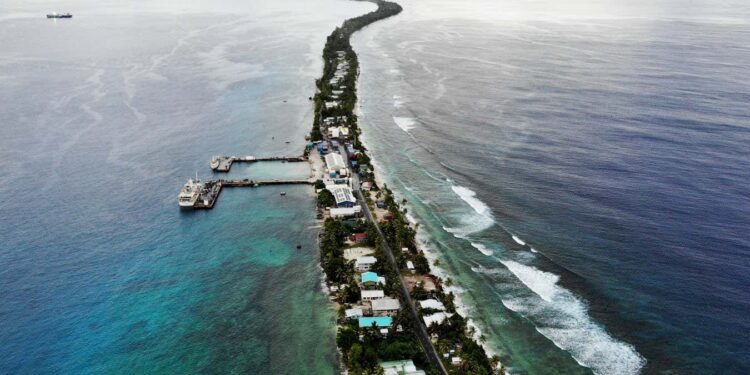
Tuvalu is extremely vulnerable to sea level rise
Photo by Mario Tama/Getty Images
How does it feel to lose your home to climate change? The roughly 10,000 residents of Tuvalu will be among the first in the world to have to confront this question.
With an average height above sea level of less than 3 metres, Tuvalu is on course to become completely uninhabitable due to flooding, storm surges and erosion. By 2100, sea levels are projected to rise by 72 centimetres and the coral atoll archipelago, which is roughly midway between Australia and Hawaii, is expected to experience flooding for nearly a third of every year.
But the people of Tuvalu have been offered an escape route. In late 2023, the Australian government announced that it would launch what effectively amounts to the world’s first planned migration of an entire nation.
Under the Australia-Tuvalu Falepili Union Treaty, 280 Tuvaluans each year will be granted Australian residency through a ballot. The first lottery opened on 16 June this year, and 3125 citizens – nearly a third of the country’s population – have already applied. The closing date to register for this year’s lottery is 18 July.
In a statement to New Scientist, the Australian government said it recognises the “devastating impact climate change is having on the livelihoods, security and well-being of climate-vulnerable countries and people, particularly in the Pacific region”.
“This is the first agreement of its kind anywhere in the world, providing a pathway for mobility with dignity as climate impacts worsen,” the government said.
Successful applicants should know the results of the lottery by the end of July and the first migrants are expected to arrive in Australia by the end of the year.
Bateteba Aselu is a Tuvaluan doctoral student at the University of Melbourne, Australia, researching the challenges posed by climate change to her compatriots. Aselu is currently on a student visa in Australia while completing her studies, but is considering lodging an application to join this year’s ballot along with her husband. Her son, who has just graduated from high school, has already applied.
She says the impacts of climate change are already being felt because the freshwater aquifers that underlie Tuvalu’s atolls, which are critical for agriculture and drinking water, are being infiltrated by seawater due to sea level rise. This is forcing people to raise their crops off the ground to keep the salinity at bay.
Stephen Howes at the Australian National University in Canberra says the new visa is “remarkably liberal”, giving successful applicants full access to nearly all Australian health and social security benefits, without discrimination based on chronic health conditions, disabilities, age or other exclusions, which is common in other visa streams.
While the agreement is ostensibly about helping Tuvalu deal with its imminent climate crisis, the prize for Australia is to stymie China’s push for power in the Pacific, says Howes. The treaty has a provision that Australia and Tuvalu must “mutually agree on” matters of security and defence agreements between the island state and other countries.
“I’ve described it as a security-migration agreement,” says Howes. “Climate change provides the framing, but it is an arrangement whereby Tuvalu gives Australia privileged security treatment, in return for which Australia will give Tuvalu privileged migration treatment.”

Tuvaluan people taking part in traditional fishing practice
MICK TSIKAS/EPA-EFE/Shutterstock
Jane McAdam at the University of New South Wales in Sydney says there are diverse views in Tuvalu about what the future holds. People have said to her that they were told the island would be underwater by now and it isn’t. She also says there are older people who say they will never leave and will die on the islands.
But McAdam sees the new migration scheme as “decent and positive”. One important aspect is that once a Tuvaluan has gained the visa, they can return home as often as they like or even live there until the situation on the atolls becomes too dire.
It will be “like an oxygen mask on an airplane”, says McAdam. “Hopefully, you will never need it, but you’re very grateful it’s there.”
Wesley Morgan, who is also at the University of New South Wales, says until now, Tuvaluans have had limited escape options if conditions deteriorated. The agreement could be extended to other nations in similar circumstances, such as Kiribati.
“This is potentially a precedent, a global first where a migration pathway is explicitly tied to climate change and sea level rise,” says Morgan. “And because of these unique circumstances, I think Australia might pursue similar arrangements in future with Kiribati.”
The question that remains for the Tuvaluan people is how they resolve their identity and sovereignty after moving away from their islands. Will they be a Tuvaluan diaspora or a nation in climate exile?
“If you have a place where you grew up and something happened and you had to move, how would you feel?” says Aselu. “Would you feel lost? Yes. So, I think that is the kind of feeling that you will have in any place around the world where you lose the place that you love, that you belong to and you feel identified with.
“Because you grew up in that place. It’s where your history is. It’s where your families are from, and it’s a place you identify with regardless of where you are in the world. And if that place is lost, how do you identify yourself? How do we identify ourselves?”
Topics:
Source link : https://www.newscientist.com/article/2485970-nearly-a-third-of-tuvaluans-have-applied-for-climate-migration-visa/?utm_campaign=RSS%7CNSNS&utm_source=NSNS&utm_medium=RSS&utm_content=home
Author :
Publish date : 2025-06-26 15:17:00
Copyright for syndicated content belongs to the linked Source.









